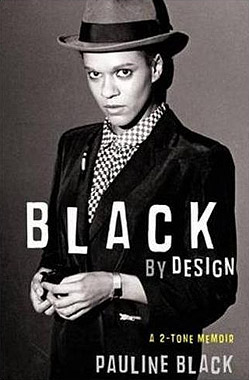
| HOME |
| NERVE |
| REVIEWS |
| ARCHIVE |
| EVENTS |
| LINKS |
| ABOUT US |
| CONTRIBUTORS |
| BACK ISSUES |
| CONTACT US |
Back to index of Nerve 19 - Winter 2011
 Black
by Design: A 2-Tone Memoir
Black
by Design: A 2-Tone Memoir
Written by Pauline Black
Lead singer of legendary The Selecter
Serpents Tail £12.99
Reviewed by Sue Hunter
This memoir begins with Pauline's life in the 50s, as an adopted black child in a white working class family. This was in overwhelmingly white Romford, where racism was routine. Her adoptive family was kind and loving, but had no perception of what it meant to be black, although her parents staunchly stuck up for her when she was discriminated against by the local church. Pauline was unthinkingly patronised; a kindly aunt gave her a golliwog for a present, oblivious to its meaning. As a child, Pauline liked the doll: she had no reference points about her origins.
Although she was clever at school and had many friends, she felt a double differentness; being adopted was a big issue as well, and she explains the unchildfriendly fostering/adoption system of those days.
At the age of nine Pauline was abused by a neighbour, a friend of one of her brothers. She describes the added trauma when she finally revealed what had been happening.
As a teenager, she discovered all kinds of Black music, and spent hours each day learning about Black history, the US civil rights movement and the Black Panthers. In sixth form, to defend her corner against tormenting boys, she styled her hair in a giant Afro, which she found to be a powerful "don't mess with me" statement.
Pauline became a science student in Coventry and lived the student lifestyle, before training as, and later becoming, a radiographer. Meanwhile she learnt to play the guitar and started singing in pubs and writing her own songs. Lawton Brown introduced her to more Black music and musicians, and she joined a reggae band.
Soon she met The Specials and the whole 2-Tone scene is described, as well as how her band The Selecter was born. This part of the book conveys the stresses and excitement, excesses and characters of the successful ska band, of life touring, the tribal youth who followed them, the National Front gangs who shouted "Sieg Heil" at their gigs and the effect of the "Sus Laws" on black youth.
Along with the exhilaration of performing came the loneliness of being a lone female singer, particularly while her bandmates carried on the traditional male sexual shenanigans. She wrote many political songs, addressing the problems of unemployed youth and racism. But the chaotic lives, rival personalities, jealousies and record companies' dodgy treatment all contributed to the break-up of the band.
Pauline began an acting career and over the years performed with the Black Theatre Co-operative, in the Liverpool Playhouse as the "Blue Angel", as Cleopatra, Billie Holiday and many other roles.
She became a presenter of "Black on Black" on Channel 4 and in that role visited the US where she met many heroes of her youth.
Amongst the high points were times of self-doubt, depression and worries about identity. After a particularly upsetting racist incident, Pauline decided to search for her real parents and she describes the emotional process of finding her birth mother and other family.
This review skims a few surface facts, but for me the depth and quality of the book lies in the emotional and political story it tells, spiced with humour and in a straightforward non-celeby style.
Read interview with Pauline Black